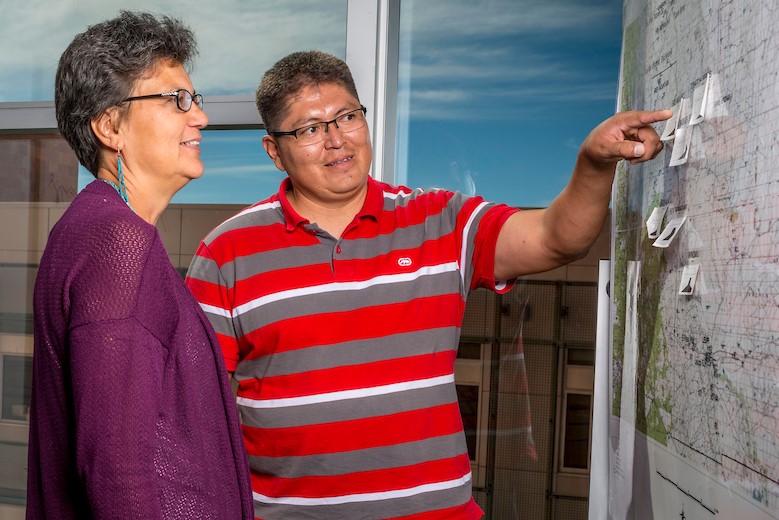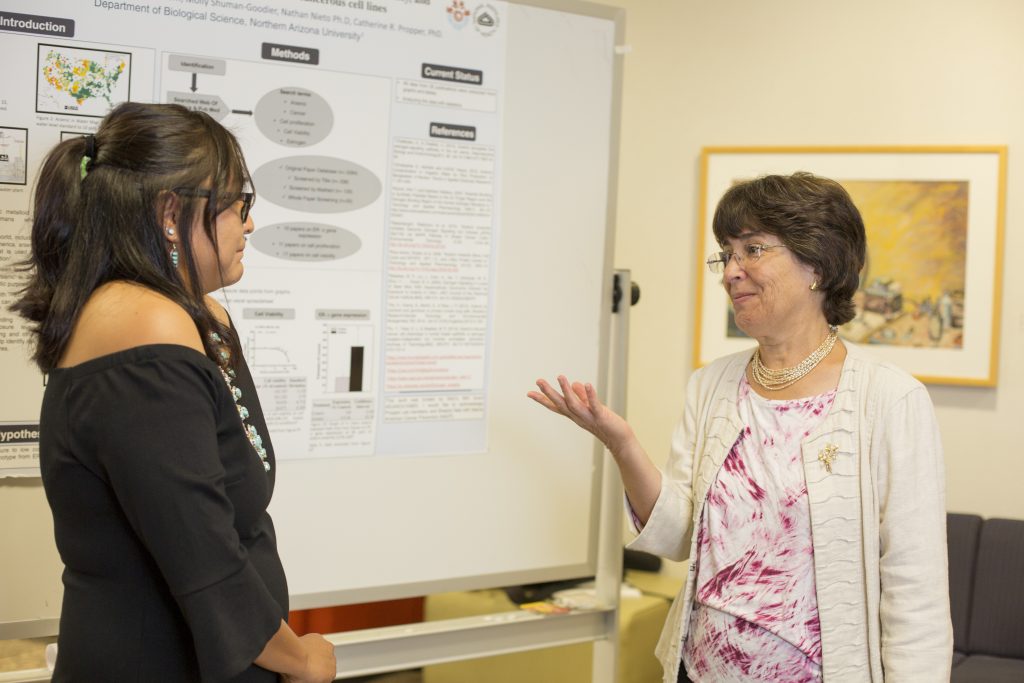By Kerry Bennett
Office of the Vice President for Research
Native Americans have the lowest rate of university enrollment and graduation rates of any group in the United States—and in STEM fields, they represent only 0.5 percent of students nationwide. Another major hurdle for Native American populations is health-related. Those living on tribal lands experience a disproportionate rate of environmentally-associated health issues such as cancer, stroke, obesity and diabetes.
A team of Northern Arizona University researchers, led by co-principal investigators Cathy Propper and Leslie Schulz, were recently awarded $2.6 million from the National Institutes of Health (NIH) for a new program that will address both of these pressing issues while providing Native American students with unique opportunities to work with world-class researchers.
The Research Initiative for Science Enhancement (RISE) program, NAU RISE for Native Americans, will provide two years of research training to both undergraduates and master’s level students across STEM disciplines—from biology to informatics to engineering. Its long-term goal is to enable and encourage Native Americans and other underrepresented students to enter Ph.D. programs in these disciplines. As a result, the RISE program at NAU is expected to enhance the diversity of the biomedical, behavioral and clinical research workforce through enhanced retention and successful graduate student experiences for Native American students.
“The RISE grant demonstrates recognition for NAU as a high research institution that has made a significant commitment to providing educational opportunities for Native American students,” said NAU President Rita Hartung Cheng. “It also recognizes our established expertise in addressing environmental issues on tribal lands and their health impacts. NAU is very proud to have been selected as a RISE university.”
The submission process for large, complex projects like this is extremely competitive. Schulz, a veteran of large grant awards, said the team’s proposal was accepted by the NIH in its first draft, crediting Propper and program coordinator Anita Antoninka for their work.
“I take pride in the fact that NAU received this grant,” Schulz said. “It’s very important because it supports students and is closely aligned with our mission.”
NAU uniquely qualified to offer innovative program
Students will tackle environmental issues on tribal lands in local communities, including the Navajo Nation, Hopi tribal lands and Yavapai Apache tribal lands, although students also may contribute to projects faculty are working on for other Indigenous peoples all over the world.
“Focusing on environmental issues on tribal land for our educational program and research experiences is particularly appropriate because NAU faculty are nationally recognized as experts in this field—and because this field is an area of high interest for Native American students,” Propper said. “This program is innovative because we are integrating culturally sensitive support, hands-on research experience and a required curriculum into a distinct and place-based theme that will generate excitement and improve success among our students.”
Program pulls together interdisciplinary team of faculty mentors
Propper and Schulz recruited faculty members who are experts in a wide range of fields to serve as mentors for the RISE program. Faculty were selected based on their research expertise in environmental health and mentoring experience with underrepresented students.
“We reached across campus to recruit outstanding NAU faculty mentors to work with these students, all of whom are researchers with world-class reputations,” Schulz said.
The faculty mentors will provide students training in the following areas of research:
- Julie Baldwin, professor of health sciences, focuses her research on reducing substance abuse and obesity for healthier Native American youth.
- Hendrik “Dirk” de Heer, associate professor of health sciences, studies improving health through prevention of chronic diseases and metabolic disorders among Native Americans.
- John C. Georgas, associate professor of informatics, computing and cyber systems, focuses his research on reducing distances to improve Native American access to health care.
- Jani Ingram, professor of chemistry and biochemistry, studies environmental contamination from exposure pathways through Native American food and water resources.
- Robert S. Kellar, associate professor of practice of biology, focuses his research on the influence of environmental contamination on wound healing associated with diabetes among Native Americans.
- Catherine R. Propper, professor of biology, studies the influence on health outcomes of naturally occurring and anthropogenic compounds common in water resources on Native American lands.
- Priscilla R. Sanderson, associate professor of health sciences, focuses her research on the Navajo Nation Healthy Diné Act and its implications for Native American health.
- Frank von Hippel, professor of biology, conducts community-based participatory research with Indigenous peoples to improve health outcomes following exposure to environmental toxicants.
Emphasis on culturally-aligned mentorship, community connections, scientific identity and values

The RISE program is targeted at top students from underrepresented groups, and the team recently completed recruiting students for the fall 2018 cohort. Students accepted into the program will participate in a summer workshop that will emphasize culturally-aligned mentorship, community connections, scientific identify formation and value alignment.
“The workshop will help the students build a strong peer group, a cohesive cohort and develop their scientific identity,” said Antoninka, who will run the workshop.
During the academic year, RISE students will participate in a special course, Success in Research Seminar, which will incorporate culturally aligned mentorship and emphasize training in responsible conduct of research, research design and methods, scientific career choices, the graduate school application process and surviving graduate school. Students will master the analysis of research results, reading and interpreting the literature, scientific writing skills and presentation of results at professional conferences. All students will be directed to courses in statistics, applied indigenous studies, environmental and/or health sciences and computer science.
“During these two years, students will form friendships that matter and relationships with faculty mentors that will put them on the path to success,” Antoninka said. “The project really hits on all the things that the students will need to be successful.”
Propper and Schulz have worked together before, most notably on the Minority Health and Health Disparities International Research Training Program (MHIRT), which enables students from health disparity backgrounds to participate in a 10-week international research experience exploring issues of health disparities among the world’s Indigenous populations.



